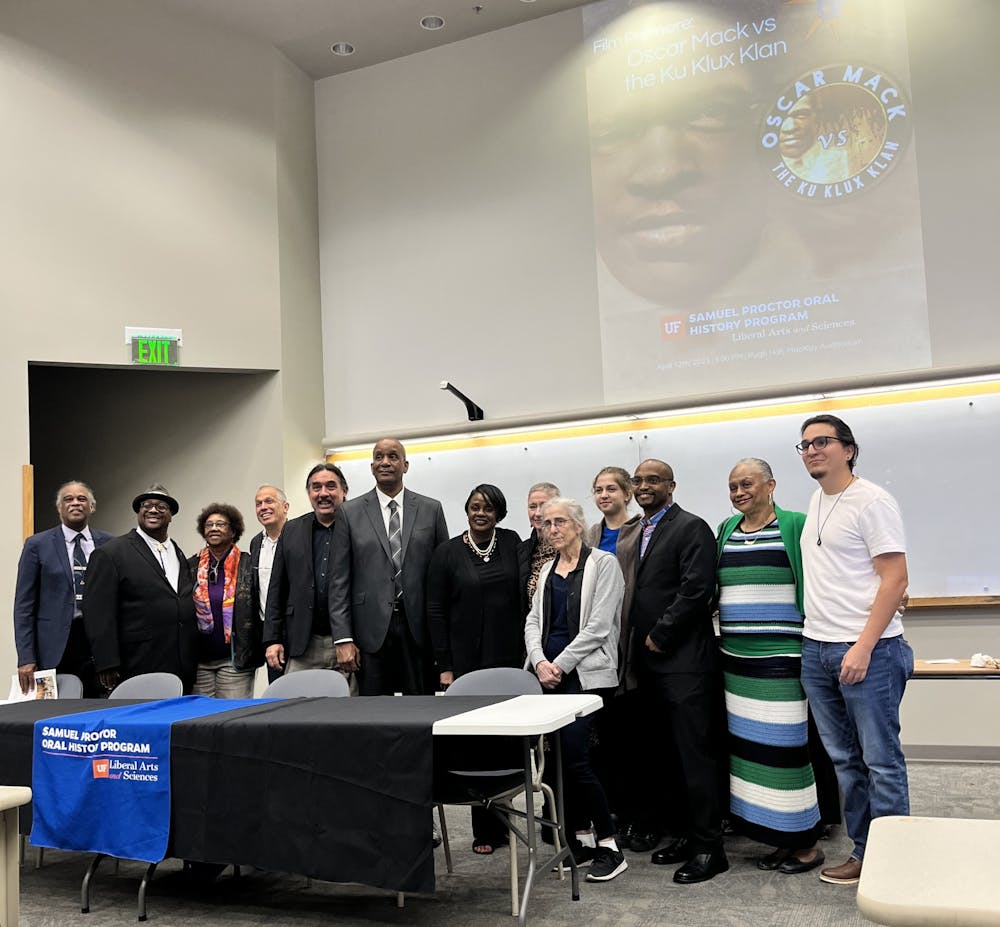It’s rare to have descendants from both sides of a historically racially-charged attack sit down and talk to historians. But the Samuel Proctor Oral History Program accomplished this at a documentary showing Wednesday night.
The program screened the premiere of “Oscar Mack vs the Ku Klux Klan” — a 58-minute film that deep dives into the life of Oscar Mack, a World War I veteran and Kissimmee resident who was attacked by the KKK in 1922.
On July 16, 1922, Mack, a postmaster in Kissimmee, was told handling mail was a white man’s job and he should leave town. Assistant Postmaster C.C. Collins gave Mack a gun and told him to protect himself, should he need to. That night, four white men came to his home, intending to cause him harm, but Mack open fired on the group.
Mack escaped Florida, changed his name to Lanier Johnson and ended up in Ohio.
Deborah Hendrix, the film’s creator, has been with the SPOHP for 23 years. SPOHP, which has been creating the film for a decade, is UF’s award-winning oral history program that was founded in 1967.
The film showcases the power of oral history, Hendrix said.
“It’s a story, and it’s an art,” she said. “This is kind of our living history.”
Historian Curtis Michelson, Rollins College professor Julian Chambliss and the SPOHP were able to piece together the events of Mack’s life with the help of his relatives, according to the event’s brochure. The film featured descendants of both Mack and Stewart Ivey, one of Mack’s attackers.
James D. Brown, Mack’s great-grandson, said he sees increasing racism as a “cancer” that’s growing at an alarming rate.
“I believe the film will hopefully be used as a tool to help people to gain greater perspective on what is really important — letting go of a lot of our preconceived notions and our prejudices and our fears and our ignorance,” he said. “When you know better, hopefully, you'll do better.”
Following the film, Hendrix, Michelson, Brown and Vanessa Bonner, Mack’s great-granddaughter, were panelists in a Q&A session. Brown shared a personal experience from 1972, where he was removed from a high school football game because of his skin color, he said.
He hopes the film will be a tool that empowers the Black community, he said.
“I want young men and young women to consider their worth,” Brown said. “Consider your worth — consider that you were born with a purpose and you’re here on this earth to do great things.”
The film was a healing experience for Bonner, she said during the Q&A. She said unconditional love is part of the solution.
“If you understand what unconditional love is, under no conditions, [you] accept people for who they are,” she said.
Brown agreed — love is important, but justice is a necessary factor of the conversation, he said.
It’s rare for a project like this film to go all the way to the documentary stage, Michelson, one of the film's historians, said. More often, the descendants of the Black and white families get together in a private event, he said.
“When you have these kinds of public events, the potential for change is just 10x,” Michelson said. “This really won't be forgotten. This is going to move Florida forward.”
The history of Black violence or violence against women is more than not written from the oppressors’ point of view, he said. The full story is not there.
“Oral history lets us get the other side of the story. And it's just humanly compelling,” Michelson said. “These voices you hear in a film resonate with it, you're going to feel something.”
Hendrix, the film’s creator, reiterates the significance of oral history. The documentary recovered Mack’s overlooked voice, she said.
“This is a recovery, I would say, of erased history,” she said. “People don't know the story.”
A second screening of the film will take place April 29 at 1 p.m. at Solid Rock Church in Kissimmee. The film is viewable on YouTube now.
Other communities across Florida are also reaching out to SPOHP for screenings in their towns, said Paul Ortiz, SPOHP director.
Contact Ella at ethompson@alligator.org. Follow her on Twitter @elladeethompson.
Ella Thompson is the Spring 2025 Editor-in-Chief and a fourth-year journalism major. She also worked as the Fall 2024 Digital Managing Editor and the Spring 2024 metro editor. In her free time, she can be found reading, planning a trip or journaling.






